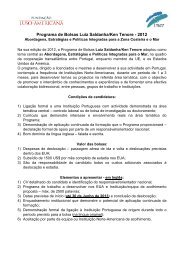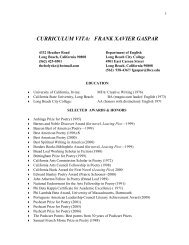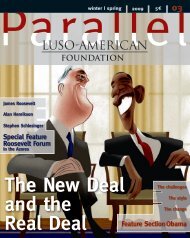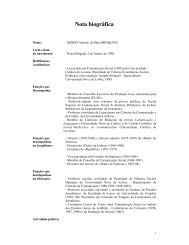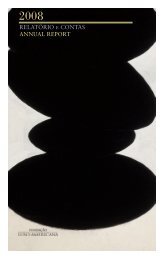Create successful ePaper yourself
Turn your PDF publications into a flip-book with our unique Google optimized e-Paper software.
28 For example,<br />
China has<br />
emerged as a<br />
leading investor<br />
in the textile<br />
sector in Tunisia.<br />
29 See Judy<br />
Dempsey, “Gas<br />
Crisis a Warning<br />
for Europe:<br />
Experts Push<br />
Increase in<br />
Energy Security”,<br />
International<br />
Herald Tribune,<br />
February 16,<br />
2006, p. 3.<br />
30 For a detailed<br />
discussion <strong>of</strong><br />
Portugal’s gas<br />
import situation<br />
and foreign<br />
policy<br />
consequences, see<br />
Luís Ferreira<br />
Lopes, “Gás<br />
Natural: O<br />
Impacto do<br />
Gasoduto do<br />
Magrebe e do<br />
Terminal GNL na<br />
Economia e<br />
Política Externa<br />
de Portugal”,<br />
Relações<br />
Internacionais,<br />
No. 6, June<br />
2005.<br />
Looking ahead, political stability and internal security will<br />
continue to be key variables in the climate for Portuguese (and<br />
Euro-Atlantic) economic participation in North Africa. Investors<br />
simply have too many promising opportunities elsewhere to<br />
take on significant risk in marginal markets. That said, the progressive<br />
extension <strong>of</strong> bilateral association agreements with the<br />
EU, and movement toward a Mediterranean free trade area,<br />
could create a more attractive climate for investment, as could<br />
the spread <strong>of</strong> EU legal and regulatory norms southward. Closer<br />
south-south integration could also help, with the creation <strong>of</strong><br />
larger markets, and more comprehensive transport and telecommunications<br />
infrastructure. From the southern perspective, the<br />
scale and character <strong>of</strong> Europe’s economic participation in North<br />
Africa will probably remain the leading variable in their economic<br />
development over the next decade. This is likely to be<br />
so despite the significant U.S. presence on the regional economic<br />
scene, and the emergence <strong>of</strong> new participants from<br />
beyond the Mediterranean, including China 28 .<br />
Energy Security and the Western Mediterranean<br />
Global concern about oil supply and price, and the tendency<br />
for strategic debates about energy to focus on the Gulf and<br />
Eurasia, have drawn attention from Europe’s other energy security<br />
concern – energy trade in the western Mediterranean 29 .<br />
Europe depends on North Africa for roughly 25 percent <strong>of</strong> its<br />
natural gas requirements. For southern European countries and<br />
France, the level <strong>of</strong> dependency is higher. Spain depends on<br />
Algeria for some 70 percent <strong>of</strong> its supply, and Portuguese dependence<br />
is in the range <strong>of</strong> 70-80 percent 30 . Most <strong>of</strong> this supply<br />
reaches Europe through two pipelines, the Trans-Med system<br />
connecting North Africa with Italy, and the trans-Maghreb line<br />
[38]



